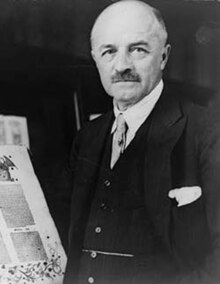Otto Vollbehr
You can help expand this article with text translated from the corresponding article in German. Click [show] for important translation instructions.
|

Otto Heinrich Friedrich Vollbehr (April 24, 1869-May 18, 1946) was a German chemist, book collector, and Nazi propagandist.
Biography
[edit]Vollbehr was born in Kiel, the son of Emil and Caroline Vollbehr.[1] He studied chemistry at the University of Marburg[2] and Berlin.[3] In 1897, he travelled to San Francisco, where he was described as "a noted pharmacist"[4] Here Vollbehr claimed to have met Adolph Sutro, who advised him on building a rare book collection.[5] By 1914, he was the chairman of a chemical company, allowing him to make a fortune during World War I.[5]
In November 1924, Vollbehr traveled to Los Angeles, where he sold a collection of 392 incunabula to Henry E. Huntington for $170,000.[6] In March 1925, Huntington purchased another collection of 1,740 incunabula from Vollbehr, for the price of $770,000.[6]
In 1930, the Library of Congress purchased 3000 incunabula from Vollbehr, for the price of $1,500,000.[7] This purchase included a Gutenberg Bible, one of only three copies printed on vellum.[8] As a result of these sales to Huntington and the Library of Congress, Vollbehr has been described as "the most important source of fifteenth-century books now in America".[9]
Vollbehr sold another 1036 books in 1936. The book dealer Israel Perlstein bought many of the books and offered the collection to the Library of Congress, but the Library rejected the condition as overpriced.[10] Perlstein later described Vollbehr's sale as "a confidence scheme".[11] (Perlstein eventually sold the books to Gimbel Brothers department store, for a fraction of their original price).[10]
Propaganda
[edit]Between 1931 and 1936, Vollbehr worked as a propagandist for Nazi Germany, issuing memoranda that attempted to influence American political opinion in favor of Germany.[12] In November 1934, he testified in front of the House Committee on Un-American Activities about his writings.[13] The hearings revealed that Vollbehr had spent most of the money from the Library of Congress on Nazi and anti-Semitic propaganda and he was accused by John W. McCormack of attempting "to incite American against American"[14] In 1940, Burton Rascoe published an article in the Saturday Review titled "Uncle Sam Has a Book", criticizing the Library's purchase of the incunabula collection because of Vollbehr's work as a propagandist.[15]
References
[edit]- ^ Peacock, Scot, ed. (2001). Contemporary authors : a bio-bibliographical guide to current writers in fiction, general nonfiction, poetry, journalism, drama, motion pictures, television, and other fields. Vol. 189. Farmington Hills: Gale. p. 402.
- ^ Verzeichnis des Personals und der Studierenden auf der Königlich Preußischen Universität Marburg. 1892. p. 32.
- ^ Akademische Liedertafel, Berlin (1906). Geschichte der Akademischen Liedertafel zu Berlin: 1886-1905. Berlin. p. 295.
{{cite book}}: CS1 maint: location missing publisher (link) - ^ "The Pacific Coast". The Pharmaceutical Era. 12 (17): 522. April 29, 1897.
- ^ a b Rosenblum, Joseph, ed. (1997). American Book Collectors and Bibliographers: Second Series. Gale. p. 321. ISBN 9780787618421.
- ^ a b Dickinson, Donald C. (1995). Henry E. Huntington's library of libraries. San Marino: Huntington Library Press. p. 208. ISBN 0873281535.
- ^ Goff, Frederick R. (1969). "The Oldest Library in Washington: The Rare Book Division of the Library of Congress". Records of the Columbia Historical Society, Washington, D.C. 69/70: 332–345. ISSN 0897-9049. JSTOR 40067717.
- ^ Goodrum, Charles A. (1982). Guide to the Library of Congress. Washington: Library of Congress. p. 27.
- ^ Dane, Joseph A. (2012). What is a book? : the study of early printed books. University of Notre Dame Press. p. 167.
- ^ a b Goff, Frederick R. (Summer 1981). "Uncle Sam Has a Book". The Quarterly Journal of the Library of Congress. 38 (3): 127.
- ^ Richardson, John V. (1992). The Gospel of Scholarship: Pierce Butler and a Critique of American Librarianship. The Scarecrow Press. p. 272. ISBN 081082499X.
- ^ Manning, Martin J. (2004). Historical Dictionary of American Propaganda. Westport: Greenwood Press. p. 311.
- ^ Activities (1934), United States Congress House Special Committee on Un-American (1934). Investigation of Nazi Propaganda Activities and Investigation of Certain Other Propaganda Activities: Public Hearings Before the Special Committee on Un-American Activities, House of Representatives, Seventy-third Congress, Second Session. U.S. Government Printing Office.
{{cite book}}: CS1 maint: numeric names: authors list (link) - ^ Swain, Martha (2014). "Ross Collins and the Incunabula". Journal of Mississippi History. 76 (1): 13.
- ^ Cannon, Carl L. (1976). American book collectors and collecting from colonial times to the present. Greenwood Press. p. 197.
